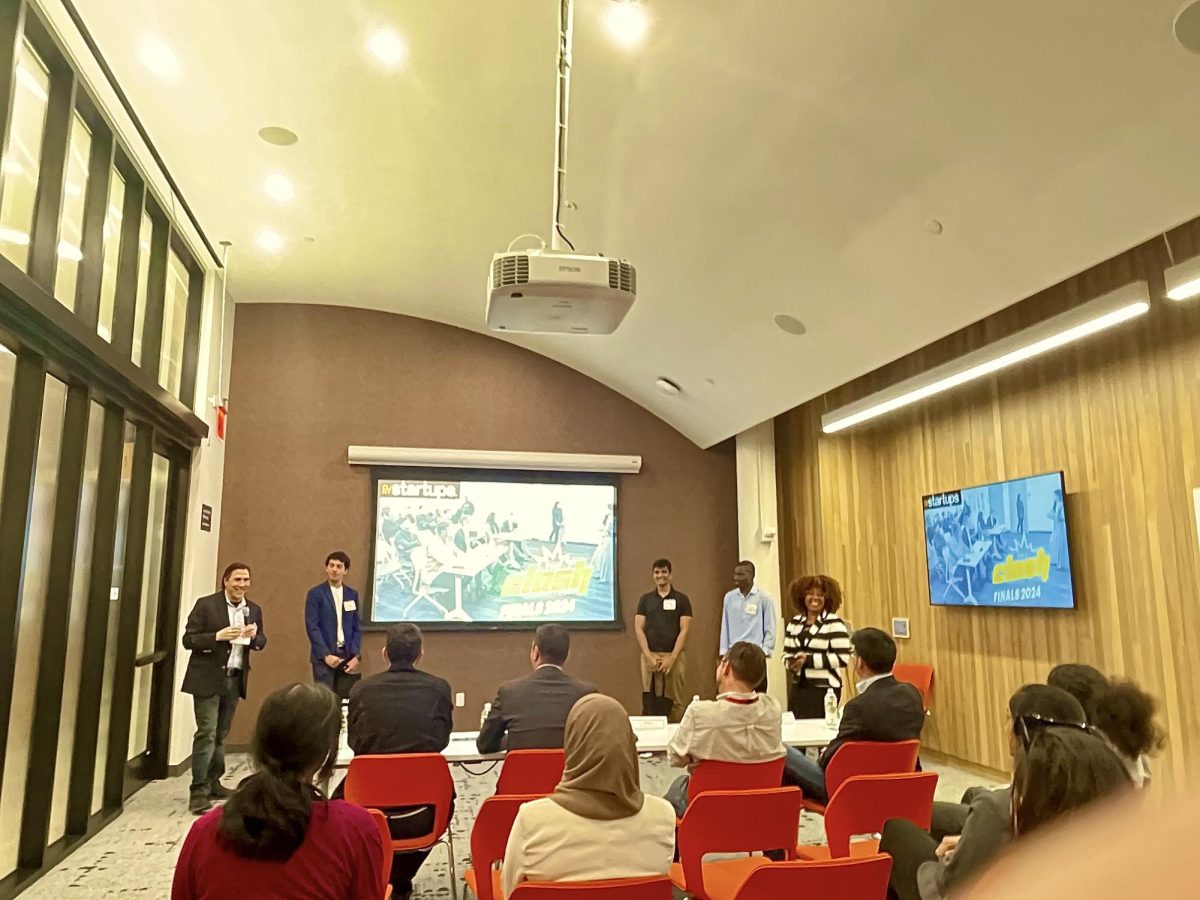By CUNY Startups hosted its third annual CUNY CLASH startup pitch competition at Amazon.com Inc.’s JFK 27 office in Midtown Manhattan on May 3.
This year, 12 students introduced startup concepts ranging from solutions in recycling and healthcare to social platforms that facilitate event scheduling — and even host debates — with strangers, acquaintances and friends.
However, many focused on finding new ways to boost student study habits, prompted not only by increased demand for studying assistance for students but also by generative artificial intelligence models and their ability to organize and learn from provided study material.
According to CUNY Startups Associate Director Adia Johnson, the space was offered by Amazon, a partner of CUNY Startups, after noticing higher attendance at the new venture accelerator event on April 5. Extending the previous decision from last year, CUNY Startups also allowed students on startup teams to present, with only one student giving the pitch presentation for each.
Carlos Vazquez won first place, and a $10,000 grant, for his study aid platform named Acadu. On the app, students can create study guides using the app’s generative AI in various formats, including a micro-scroll format or turnable flashcards, for $40 a month. They can earn points for studying, climb leaderboards and customize and boost their profile.
Vazquez, a sophomore and finance major at Baruch College, founded Acadu in late November 2023 and has since grown it to over 100 users, testing it in three low-income public high schools in the city, as well as the Weill Cornell Graduate School of Medical Sciences.
Vazquez said building out Acadu’s user base on both ends first, testing in high schools and the medical school, would ensure the company covers its bases and enhances the experience for undergraduate students as well.
Inspired by his time taking standardized tests in high school, like the SAT and ACT, he created Acadu originally as an SAT study platform. His parents didn’t pass high school, so for him, figuring out how to study for the tests was a solo affair.
“I was at a disadvantage because all the other students had been studying for years because their parents put them in that, and my parents didn’t,” Vazquez told The Ticker.
In his presentation, he highlighted the 20% year-over-year growth in online tutoring over the past five years and a 6.5% expected growth rate in the test prep market over the next five, highlighting a demand for platforms that enhance student study habits.
Vazquez said the prize money will be allocated to increase marketing, AI research and development, cloud storage and collecting user feedback.
The second-place prize, $4,000, went to Raafe Jim for his startup named Logist Debates Inc., a social media platform for holding live debates that was founded in November 2022. Jim is a junior at Baruch, pursuing a major in business administration.
“As Gen Z, and the youth in general, we love getting into arguments,” Jim said. “Especially arguments on social media, regarding things as little as ‘Is a hot dog a sandwich?’ or ‘Does milk go in before or after the cereal?’ all the way to very complex and pressing issues, such as, ‘Is abortion a human right?’”
Logist was created to promote “thoughtfulness and meaningful change through conversations that matter” by matching users one-on-one with those that hold different views on randomly assigned topics to debate on video chat.
In his presentation, Jim cited a study by the University of California, Berkeley and the University of Chicago, which found that video-based conversations were five times more likely to decrease polarization among those who disagree about topics compared to text-based conversations.
To determine the winner, each debater will be given one virtual token to “give” to their counterpart when they have a valid argument or convince them of their viewpoint. In the future, Jim hopes to integrate a live audience feature that will have listeners vote on the winner as well.
He also said the company plans to have the platform eventually host sponsored debates, where brands like Coca-Cola and Pepsi can compete with each other, as well as allowing collegiate organizations to promote political debates. Its business model will also include advertisement housing and premium subscription options.
His team plans to use the $4,000 reward mostly on product development, followed by marketing and other expenses, and has set the beta launch date for September.
Maxwell Tawiah, a sophomore studying computer science at Queens College, won third place for his startup, ClassCap, along with a $2,000 prize. The smart camera app directly captures photos and videos of study materials, like lecture notes, exercises and slide shows, and sorts the notes by course, session and topic by syncing with the user’s calendar.
ClassCap is meant to address the loss of student productivity when photos of notes and slides get lost in gallery apps, most often taken so students don’t need to listen and write at the same time during lectures.
“I had this problem as a freshman; taking pictures in class, [then] it’s time to study and you can’t find them, so I kind of felt like I wasn’t the only one having this issue,” Tawiah said.
But it does more than organize — the app’s AI can read, synthesize and even translate notes into 72 different languages. It can create quizzes based on course material to help students study for exams.
The subscription-based service syncs classes between students, and also offers extra cloud storage through in-app purchases. At Queens College, it’s received hundreds of downloads.









